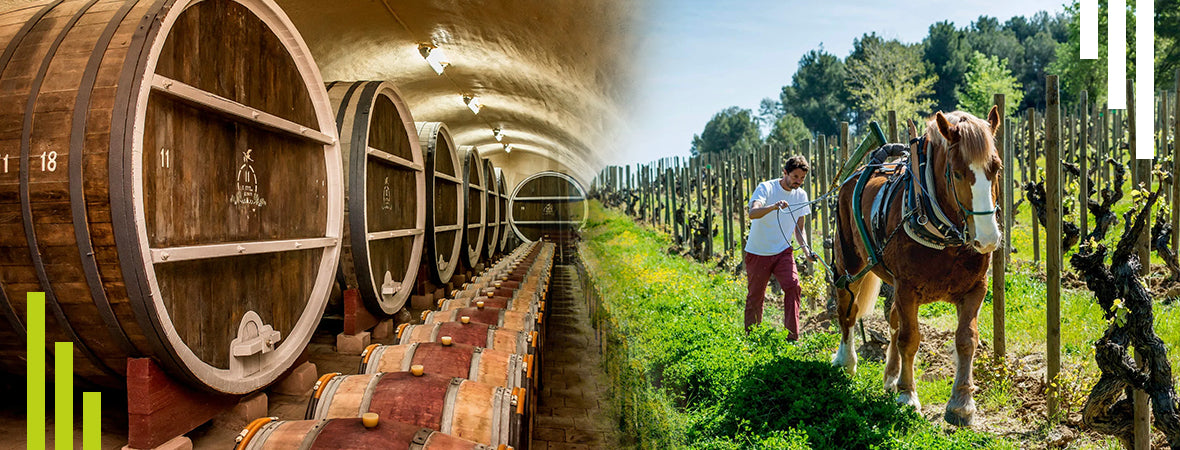All over the world, a change has occurred in regards to the way people are choosing their consumer products and spending their money. Mass production has fallen greatly out of favour amongst the discerning public, and small, independent companies doing things in their own way and to their own principles have become increasingly more successful and prominent on the market. Part of this change in the attitudes of both producers and consumers has been due to the rise in demand and popularity of organic produce, items which have a strong connection to the region they were produced in, and which are certified to carry as little chemical content as possible, or none whatsoever. We have seen this have a huge effect on way the food is produced, manufactured and purchased, and it was only a matter of time before such principles began to effect the world of wine. The Rise of Biodynamic Farming Perhaps the more niche and extreme end of this issue has been evident in the rise of biodynamic wines, those which have been made from vines grown to the strict biodynamic principles of organic farming laid down by Rudolph Steiner in 1924. Such principles involve the use of cow manure, powdered quartz and several preparations made from medicinal plants. Steiner's belief was that by working with fruits and vegetables (including grapes) using his methods, and by aligning one's farming practices with the changes in the moon, you could greatly increase both the yield and the quality of your harvest. However, the biodynamic principles go considerably further when it comes to wine production, and biodynamic wineries often do all that they can to ensure their vineyards are moving with what Steiner referred to as the earth's 'natural rhythms' – the changing of the tides, the regeneration of soil, the way moisture is pulled from the earth and released by the vines into the air. Indeed, even many high end wineries in established appellations of France, Germany, Austria and elsewhere are now ploughing their fields with horses, scattering crystals on their soil and rearranging their barrels to benefit from the moon's gravitational pull in order to reap the supposed benefits of biodynamic wine production. Positive Results It is probable that many wineries began experimenting with biodynamics as a way of ensuring their customers they had their organic and natural interests in mind, such were the concerns and interests of a particular and wealthy demographic of the wine buying market. However, as the initial results were surprisingly very positive indeed (with not only sales of such wines being much higher than anticipated, but the reviews and general feedback also) the past few years have seen more and more wineries turning to biodynamics to improve their chances in the highly competitive wine market. Interestingly, most wineries would now claim their choice to convert to biodynamics was based on the quality of their produce alone, and less to do with the selling appeal of the biodynamic label they could put on their bottles. Tasting Biodynamic Wine But what is biodynamic wine like? Does it have any distinguishing features that make it worth looking out for? In recent years, many Michelin starred chefs in both the United Kingdom and France have insisted on stocking only biodynamic and organic wines in their cellars, based on the belief that they couple far more successfully with organic foods carrying their natural, fresh flavours. Such testimonials are hard to ignore, and if biodynamic wines are good enough for Paris, perhaps it is high time the rest of us paid more attention to them. The general consensus seems to be that biodynamic wines are much the same as other organic or natural wines, containing slightly more sediment than usual and holding a more mellow, sappy character than might be expected. One of the most regular statements made by wine experts regarding biodynamic wines is that they hold more of the terroir in their flavours – that is, that the characteristics of the soil and land they are grown in come across in the taste and the aroma of the wines. This would certainly chime with the initial theories put forward by Steiner in the 1920's, and is enough for fans of biodynamic farming to claim its superiority. However, the statement is in itself deliberately broad and open to interpretation, and such subtleties of flavour (if they exist at all) are highly likely to not be picked up by the general wine drinking public. All of this aside, though, if biodynamics helps farmers and wine producers attain quality produce without resorting to the overuse of chemicals and a disconnection from the land they work with, it is surely a step in the right direction. If the end product also tastes great and has something valuable to offer to the wider world, then who could possibly argue against it?

Biodynamic wines the latest phase of the organic revolution
Biodynamic wines the latest phase of the organic revolution
- by John Ha
- March 06, 2023
- 3 min read
Related Blog Posts
- by John Ha
- July 03, 2023
- 4 min read
- by John Ha
- June 26, 2023
- 3 min read
- by John Ha
- June 19, 2023
- 3 min read




